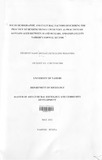| dc.description.abstract | The study sought to determine what socio-demographic and cultural factors describe the practice of sending money to kin in rural areas, with regards to people aged between 18 and 50 years, working in Nairobi city's formal sector. The socio-demographic factors looked into associated factors such as gender and education background and leisure activities, which included what activities were engaged in, how often, with or without company, and how much was spent during the entire affair(s) to the practice of sending money to rural kin. Cultural factors looked into were associated with traditions, which included what traditions the research sample was familiar with, whether they believed in them, and whether their beliefs had any impact the quantities of money sent, as well as the frequency with which it was sent to kin in rural areas.
Addressing these aspects enabled the study to adequately tackle the area of research as defined by the research topic. Research findings will shed light on the socio-demographic and cultural factors that describe hindrances to the intent to send money to rural kin, and may help explain why rural areas aren't receiving any remittances from the sons and daughters that left to find a better life. Interviews were carried out, and literature from various sources including the Government of Kenya's Integrated Household Budget Survey was reviewed. Three theories, Maslow's Theory of Motivation, Sherifs Social Influence theory and Hofstede's Model on Culture were key in tying the research findings to the available literature.
Data was presented and analyzed using the Statistical Package for Social Scientists. The findings from data analysis enabled the study to determine what proportion of Kenyans between the ages of 18 and 50 years employed in Nairobi's formal sector were sending money to their kin in the rural areas, how much they were sending, as well as what social and cultural factors affected the practice of sending money to their rural kin.
The study found out that social factors had greater reach in describing the practice of sending money to kin up country than did their cultural counterparts, mainly because 86.5% of the sample cited not knowing any traditions, and further perhaps because 83% of the sample earned Kenya Shillings 45,000 and below, despite the fact that the cost of living was the same for this proportion of the sample as it was for those that earned more money. Recommendations to improve the practice of sending money upcountry including tax incentives for those who send money to their rural kin for investment in development activities, as well as encouraging sharing of traditions were made were in relation to the research findings. | en_US |

